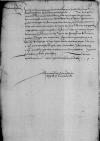Wir hetten gemeint, dor Provincial Diet of Royal Prussia ⌊tagProvincial Diet of Royal Prussia ⌋ zu Graudenz (Grudziądz, Graudentium), city in Poland, Voivodeship of Pomerania, on the upper east bank of the Vistula, Graudenz (taking turns with Marienburg (Malbork)) was the venue for the Provincial Diet of Royal Prussia, which were chaired by the bishop of Ermland (Warmia)⌊GraudentzGraudenz (Grudziądz, Graudentium), city in Poland, Voivodeship of Pomerania, on the upper east bank of the Vistula, Graudenz (taking turns with Marienburg (Malbork)) was the venue for the Provincial Diet of Royal Prussia, which were chaired by the bishop of Ermland (Warmia)⌋ solte von wegen des gebruchs der notturfft, / wie Graudenz Town Council ⌊die von GraudentzGraudenz Town Council ⌋ durch ihren heuptman haben antzeigen lassen, / ungehalten blieben sein, / dohin wir uns auch aus leibs schwacheit, / die unns bei zwei monat eingehalt(en), / nicht hetten mugen begeben. / Uns ist aber vor wenig tagen durch unnsern diener von ko(nigliche)m hove der brieff mit ko(nigliche)m anhangendem siegel von wegen der appellation geworden, / wie ihn die Council of Royal Prussia the most important local authority in Royal Prussia. It consisted of two bishops (of Ermland (Warmia), who served as the Council’s president, and of Kulm (Chełmno)), three voivodes (of Kulm, Marienburg (Malbork), and Pomerania), three castellans (of Kulm, Elbing (Elbląg), and Gdańsk (Danzig)), three chamberlains (of Kulm, Marienburg, and Pomerania), and representatives of the three Great Prussian Cities – Gdańsk, Thorn (Toruń), and Elbing (ACHREMCZYK 2016, p. 17-18)⌊konigliche rethe dieser landeCouncil of Royal Prussia the most important local authority in Royal Prussia. It consisted of two bishops (of Ermland (Warmia), who served as the Council’s president, and of Kulm (Chełmno)), three voivodes (of Kulm, Marienburg (Malbork), and Pomerania), three castellans (of Kulm, Elbing (Elbląg), and Gdańsk (Danzig)), three chamberlains (of Kulm, Marienburg, and Pomerania), and representatives of the three Great Prussian Cities – Gdańsk, Thorn (Toruń), and Elbing (ACHREMCZYK 2016, p. 17-18)⌋ habenn begert, / des wir E(wer) E(rbarkei)t eine warhafftige copei zuschicken, / darnach sich E(wer) E(rbarkei)t unnd die gerichte werdenn wissen zuhalten. Hiemit gotlichen gnaden bevolhen. /


 APG 300, 53, 268, p. 90
APG 300, 53, 268, p. 90